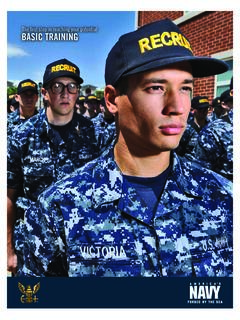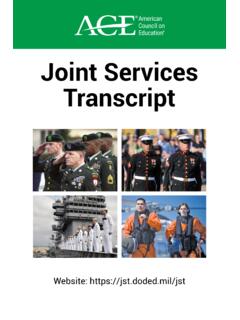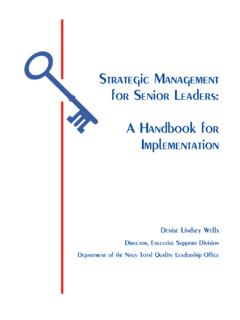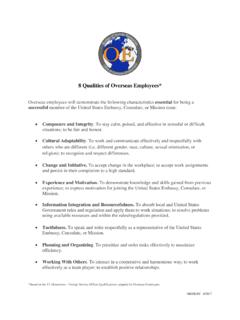Transcription of NAVY HEALTH PROFESSIONS SCHOLARSHIP PROGRAM (HPSP)
1 navy HEALTH PROFESSIONSSCHOLARSHIP PROGRAM (HPSP)MEDICAL CORPSUNITED STATES navy Your personal pursuit of saving others. Thank you for your interest in navy medicine . Since the establishment of the navy Medical Corps in 1871, navy Medical Officers have served alongside the Sailors and Marines who put themselves in harm s way to defend the Constitution and protect our Nation and the American way of life. The often repeated statement thank you for your service is a common way of expressing gratitude to our Nation s warfighters, but also has a subtle connotation that separates military service from civilian life. While there are certainly aspects of service that differ from civilian life, we all come from the same neighborhoods with similar hopes, dreams, and aspirations. The transformation from student to physician is analogous in many ways to the transformation from civilian to Naval Officer.
2 It begins with a deliberate choice of who you want to be and what you want your life s work to represent. navy medicine helps protect the highest ideals that unite us all as Americans by promoting the HEALTH and readiness of those who also serve in as part of an integrated healthcare team with missions as diverse as its patients, navy Physicians have the opportunity to provide life-saving healthcare around the world, work on cutting-edge research in state-of-the-art facilities, and teach in HEALTH programs with exponential effects around the globe. I encourage you to use this booklet as a starting point to begin conversations with others about Naval Service as a physician. The decision to serve your country is admirable, especially during a time of war. Our Sailors and Marines deserve expertise, quality and compassion in their doctors and should you choose to be one of us, you will truly understand the special calling of service.
3 I wish you the best of luck in your personal pursuit of Admiral James L. Hancock MD Medical Corps, US navy Chief of the Medical Corps Medical Officer of the Marine Corps2 Why the navy ?Every prospective applicant should consider the advantages of each service and also consider an application to the Uniformed Services University of HEALTH Sciences (USUHS). The navy offers a variety of opportunities in aviation and undersea medicine as well as traditional medical officer roles on board ships or with land-based units. It is worthwhile talking to people about their experiences and perceptions of the culture within each service. A service culture that most closely aligns with you as an individual is important to career happiness. The navy also provides all the medical care for the Marine Corps, so anyone interested in serving with the Marines as a doctor does so through navy medicine .
4 The opportunity to deploy on humanitarian missions to South America and Southeast Asia onboard Naval Hospital ships is a common attraction to navy medicine , as is a preponderance of duty stations in metropolitan areas near the is the offer?The HEALTH Professional SCHOLARSHIP PROGRAM (HPSP) offers a full-tuition SCHOLARSHIP plus a monthly stipend exceeding $2,300 per month and a $20,000 signing bonus in return for a three or four year commitment to serve as a Naval physician. Physicians serve as commissioned Naval Medical does the payback work?You will be required to apply for military residency training via the graduate medical education selection board process sometime referred to as military match. There are some opportunities to apply for civilian residencies in specific undermanned specialties. The terms of your HPSP contract will define your obligation after residency are the financial benefits of Military Residencies?
5 In addition to top-notch training programs with board pass rates ranked among the top residencies in the country, you will receive full officer pay and benefits which significantly exceeds civilian residency pay. Veteran benefits including the Post-9/11 GI Bill, healthcare, and other special programs also help to incentivize applicants interested in military are the requirements during medical school? Can I be called-up during medical school?No. While in medical school, your job is to become the best doctor you can be, and the HPSP office works very hard to make sure your service obligations do not interfere with your studies. Your primary obligations are an annual HEALTH certification and to complete one 6-week Active Duty Training (ADT) once a is Active Duty Training (ADT)?As a HPSP student, you are a reservist.
6 As such, you are required to serve 6-weeks of active duty time per year. Because your primary responsibility is medical school, the HPSP central office will coordinate with you in regards to how you want to spend ADT periods in a way that matches your personal and educational goals. The most common pathway is for students to use their first ADT period to complete Officer Development School (ODS). Most will take school orders for their second ADT period, where their job is simply to stay in their local area and study for their board exam (you will get active duty pay and allowance to stay at school and study). Students take advantage of their third and fourth ADT periods to travel to military hospitals and complete interviews or audition rotations during the early months of their fourth year of medical school. The benefit is that while on ADT, in addition to active duty pay, funding for travel, lodging and food will be is Officer Development School?
7 Is it like Bootcamp?Bootcamp, as portrayed in Hollywood, is reserved for the enlisted indoctrination process. The indoctrination process for medical officers is very different. It is called Officer Development School (ODS) and is located in Newport, RI. Training lasts five weeks and is significantly less intense than bootcamp. ODS is designed to be the first step in your development as an officer and to provide a familiarization with the customs, courtesies, and traditions of Naval is the Military Match?Both civilian and military residencies undergo a match process in which students from every medical school compete for a limited number of residencies. Civilian or military, this process can be highly competitive with few guarantees for even the most successful medical students. The military match occurs in December as opposed to the spring for allows HPSP students to also apply to be selected into the navy Active Duty Delay for Specialist (NADDS) PROGRAM that authorizes them to complete a civilian residency.
8 As with all residency matching, each PROGRAM is limited in how many people can be selected and those members with the most competitive applications are specialty training opportunities exist in the navy ?Every year, the navy makes strategic decisions as to how many of each specialty it needs to train in order meet all aspects of our mission. Narrow and highly competitive civilian specialties such as dermatology are equally competitive in the navy . It is important to understand that no recruiter can guarantee your professional future. The opportunities and competitiveness for specialties in the navy are comparable to their civilian counterparts and the only guarantee comes from making yourself the most competitive applicant you can official 2019 Message is provided as an example of the opportunities available to 2020 Medical Student Graduates.
9 NADDS means HPSP students interested in these specialties could apply for permission to pursue a civilian residency and join active service afterwards. They are a good gauge of what navy Medical needed this year, but should not be used for planning : These are intern opportunities only, you will apply for specialized residencies during your intern year (See following pages).5 BUMEDNOTE 152412 Jul 2019 SPECIALTYG raduate Medical Education (GME) positions listed are projection and subject to change per operational and military medical treatment facility manning requirements.* Deferment applications will also be considered for anesthesia and neurology.** NCC Neurosurgery position will go to highest scoring candidate for either navy , Army, or Air Force*NADDSOPPORTUNITIESN aval MedicalCenterCamp LejeuneNaval Hospital Camp PendletonNaval HospitalJacksonvilleNaval MedicalCenter PortsmouthNaval MedicalCenter San DiegoTotalNCC FamilyMedicine FortBelvoir CommunityHospitalNCC Walter ReedNational MilitaryMedical CenterTRAINING SITEANESYESYES10101212121240203830481712 2816613246101115351462428110121734146241 827161**13413454 YESYESYESTBDEMFMGENSURGNEUROSURGOB/GYNIM ORTHOOTOPEDSPSYCHTYUROT otalGRADUATE MEDICAL EDUCATION (GME) POST-GRADUATE YEAR 1 SELECTION GOALSD isclaimer.
10 The tables provided are intended for example purposes only and not indicative of future table only applies to the graduating medical school class of 2020 but a similar note will be published during the spring of your 3rd year. Transitional Year (TY) is the most common internship for those who wish to apply for one of the more specialized residency programs (radiology, dermatology, etc.) This is similar to many civilian programs and ensures a fundamental base of knowledge for all general practice physicians. Traditionally, approximately 10% of HPSP students are authorized for a deferment to train in a civilian residency and begin their active duty service commitment afterwards. This option is known as : The tables provided are intended for example purposes only and not indicative of future table applies to current interns and GMOs returning from the fleet.










